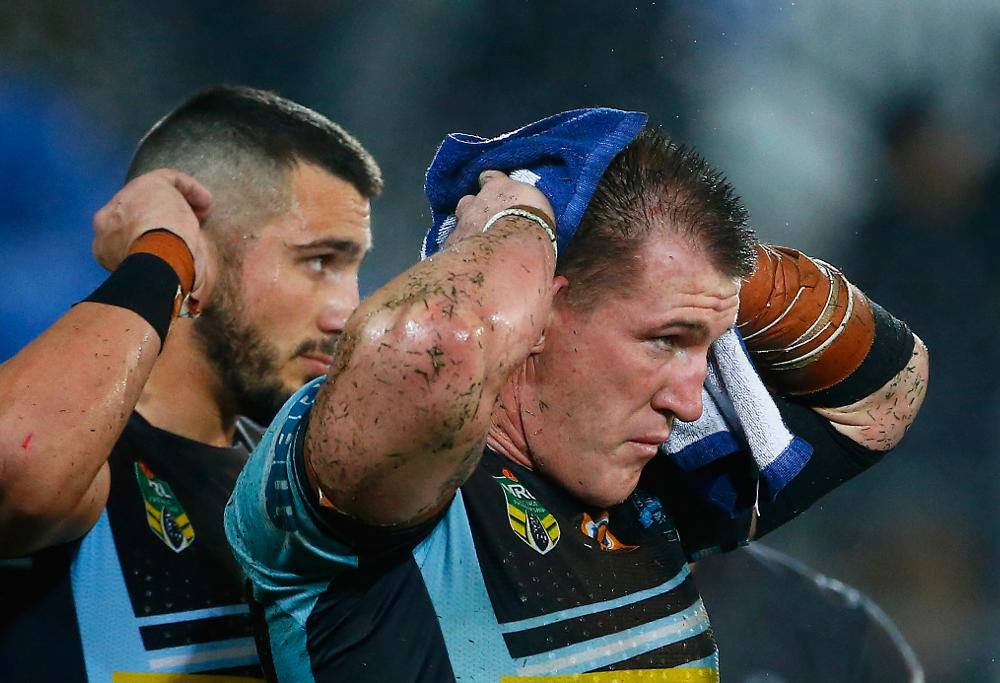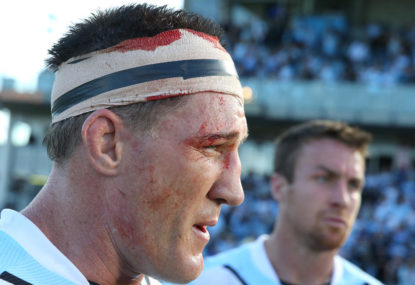While there were no doubt financial and competitive reasons why the 2017 Rugby League World Cup was again limited to 14 countries, it seems an awkward number. So, many fans are looking ahead to the 2021 tournament, when the event will grow to 16 teams.
With a bevvy of towns and cities complaining about missing out on pool games, 16 teams would have allowed a handful of extra fixtures, rewarded two more countries for their effort, and given four pools of four teams and no need for the unfair cross-over qualifiers between pools.
With two more nations able to wave their flag on the big stage in 2021, here are some of the teams that might sneak through next time around.
Cook Islands
The Kukis will no doubt be smarting after being the only team from the 2013 World Cup to be omitted in 2017, effectively being replaced by Lebanon.
There probably isn’t another nation that could feel more aggrieved at the qualification process, with the Cook Islands given a one-off sudden death game against Tonga as far back as 2015 to qualify. They lost 28-8 and that 80 minutes formed the end of their dreams.
Tonga’s performance in the coming weeks may reinforce how harsh that process was. Then again, others have questioned the wisdom of including a nation of less than 20,000 when most of their players were born in New Zealand and Australia.
But rules are rules and if other nations can exploit the heritage qualification process, is it fair to be structuring qualifiers around what are essentially commercial interests?
Canada
We already know there will be two guaranteed places for the Americas in 2021, after the USA won the right to represent the region this time around with some incredibly tense games against Canada and Jamaica.
Canada has been building rapidly in recent years and, as well as the advent of the Toronto Wolfpack, has had players performing admirably in competitions around Australia. They are not reliant on heritage players either and have sent several Canadian players across the Pacific to gain experience with country clubs. Those that have made the journey have largely impressed.
The USA beat the Canucks 34-24 in the deciding game for qualification, after Canada had beaten the Hawks in the two previous games.
Jamaica
Jamaica have improved greatly in recent years, only losing 20-14 to the USA in the qualifiers. They are now having greater luck tapping into Jamaicans playing top-flight rugby league in Europe and are being taken much more seriously.
Their most recent effort was a 34-12 loss to France in a pre-tournament friendly, but the expectation is the Reggae Warriors can bridge that gap in coming years with astute coaching and talent identification.
Jamaica beat Canada 28-14 in August in what was considered a shock result at the time, but could become a sign for the future.
[latest_videos_strip category=”rugby-league” name=”League”]
Greece
There has been a promise that the winner of the 2018 Emerging Nations World Championship will be given a favourable path into 2021 World Cup qualification. Most pundits close to this event feel that either Greece or Canada will set the pace.
The Greeks have a wealth of NRL and Super League players they could call upon through heritage, but to their credit have also championed the importance of homegrown talent.
The nation was previously expelled from the international federation because of infighting between rival identities, but has made every post a winner since being readmitted. A Greece vs Italy game at the next World Cup would certainly get the passions flowing.
Philippines
For the past five years, the Philippines have been far and away the best team in East Asia. They have racked up big scores against others in their region, and handed out a few spankings to others from further afield too.
At one stage the Tamaraws had four NRL-experienced players in their line-up. Certainly the proximity and level of migration to Australia and New Zealand has assisted their cause, as has their famed fighting spirit. You could argue they deserve to be ranked much higher than their current standing at 34th.
Malta
One of the highest ranked current teams to never appear in a World Cup, the Maltese are situated in 17th on current form and their last start was a 48-16 win against Hungary, in a particularly comprehensive display. The Knights also had success against an Italian team in an under 16s clash the same day.
Another favourite for the 2018 Emerging Nations World Championship, Malta have been playing international rugby league since 2004 and benefited from some classy Australian-based heritage players.
Just 500,000 people live in Malta, and the team has had to overcome numerous hurdles relating to finances and cancelled fixtures in recent years, so it would be a remarkable tale for them to appear on the big stage.
Serbia
The chat about Serbia becoming one of the next powerhouses in rugby league has been loud for several years now, but that is tinged by their final qualification results for the 2017 tournament, where they were beaten 50-0 by Wales and 62-14 by Italy.
The Serbs worked hard to establish a credible domestic league and have been harsh critics of how other countries use heritage players. However, that philosophical stand-off may be a disservice to them if they continue to be well-beaten by fellow fringe World Cup participants.
There’s no doubt the Serbians have the ambition and physical presence to make a fair crack of it should they produce enough elite players.
Russia
The last team dismissed from the 2017 World Cup qualification process was in the hunt right up until November last year, where they were unceremoniously routed by Italy 76-0 in Leigh, England. The Bears are now ranked 19th and have slipped from the public conscience.
With little English-language coverage of their activities, they are easily out of sight and mind, but it’s worth remembering the Russians have already been to a World Cup (2000), where they challenged Fiji before falling 38-12. They also beat Lebanon 80-0 in 2008.
There are peaks and troughs in every nation’s competitive cycle and hopefully Russia will be on their way back soon.
Norway
The Norwegians are ranked the highest of any Scandinavian country, lobbing in at 22nd on the latest rankings. Frequency of competition is a difficult hurdle, although they did beat the more-fancied Czech Republic 30-26 in a zinger of a match only a fortnight ago.
There seems to be some uncertainty about whether any teams from Scandinavia will be present at the 2018 Emerging Nations World Championship or whether a combined Scandinavia team will contest a special regional pool.
Germany
Okay, I’m ignoring a heap of higher-ranked teams to include Germany here, but there’s a reason for that – namely the number of heritage players in both Australia and England that could qualify.
Germany is 28th on current standings, but beat a team of domestic Welsh competition players 38-34 recently. To emphasise the extent of that win, it was achieved away from home, in Cardiff.
There’s also been whispers on the fringes that Paul Gallen would like to pull on the German jersey in his twilight years. If you recruited around the veteran forward, you imagine the quality of players that may nominate would lift drastically.

Photo by Jason O’Brien/Getty Images
Vanuatu
Another leftfield pick, but those who follow amateur and semi-professional levels know the quality of players that Vanuatu could call upon at their strongest.
NRL players Justin O’Neill, Zac Santo and Travis Waddell all boast heritage in the Pacific nation, which is perhaps most famously known in league circles as the place where Mal Meninga’s family originated. The Queensland Cup has also been blessed over the years by a number of quality athletes from the archipelago.
Vanuatu tested the Solomon Islands recently and hold an unbeaten 3-0 record against their Melanesian neighbours. They have a strong focus on domestic competition and some dedicated professionals steering the ship from an administrative perspective.
It’s worth noting that Niue, a team that previously beat Vanuatu, would also fancy their chances.
Chile
One of the most rapidly expanding domestic leagues in the world exists on the other side of the Pacific, which will host the inaugural Latin American Rugby League Championships on November 17-18 of this year. Chile also has a strong mix of quality Australian-based players, largely due to the number of refugee arrivals in the 1980s.
An often overlooked fact is that, via its links to Easter Island, Chile has a Polynesian influence that can deliver players of wildly different physical attributes.
At present, the Chileans are the highest-ranked team in Latin America, and though it will be a big task to challenge Canada and Jamaica for the second Americas qualification position, they have it in their sights.
Argentina
Along with Chile, Colombia and Mexico, will contest the Latin American Championships in three weeks. Argentina is somewhat of an unknown commodity, but with 100,000-plus rugby union players and one of the top pedigrees in the world for the 15-man game, they cannot be discounted entirely.
In a nine’s tournament last year, Argentina unexpectedly beat Chile 16-0 in the final and have brought on an array of new coaches to help them emerge from the shadows.
South Africa
If we’re talking about sleeping giants of rugby league potential based on their efforts in rugby union, then South Africa also deserves to be in the conversation.
The Safas were beaten by Lebanon in the qualification process for the 2017 tournament, losing 40-12 and 50-16 in a two-game series that was played on home soil in Pretoria and did not feature Lebanon’s best players. While that doesn’t seem to bode well for the future, the signs of talent are hard to ignore, should the southern hemisphere sporting powerhouse tap into top-level coaching and a greater share of the athletes currently going to union.






























































































